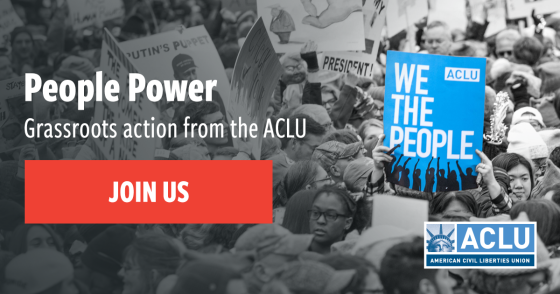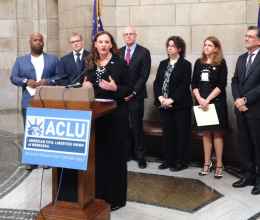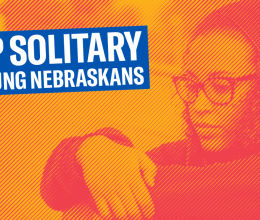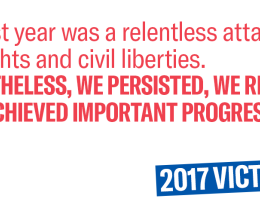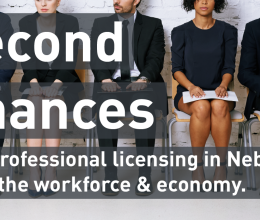
Organization releases study on how the professional licensing structure presents barriers to re-entry for people with a criminal conviction.
LINCOLN, Neb – Today the ACLU of Nebraska released “Second Chances: How professional licensing in Nebraska hurts the workforce and our economy.” The white paper looks at ways the professional licensing structure in Nebraska affects those with a felony conviction and the growing voices from across the political spectrum advocating for change.
“Nebraska’s system of mass incarceration hurts our communities with a disproportionate impact on communities of color and low income Nebraskans,” said Danielle Conrad, Executive Director. “What is rarely discussed is the impact incarceration has on Nebraska’s workforce and economy. The overwhelming majority of those in our prison system are non-violent offenders who will return to our communities within a few years of imprisonment. For someone with a criminal conviction to be a productive member of our community, they need to be able to fully participate in our economy and workforce. Nebraska’s existing professional licensing structure is full of potential barriers for those who have paid their debt to society to secure good jobs which not only helps them and their families, but supports our economy, and is a key factor in reducing recidivism.”
The ACLU says they discussed their research with front-line staff at many reentry organizations. According to the ACLU, they’ve learned that people with a criminal conviction are often interested in licenses associated with moderate or low income professions such as nursing assistant, nursing home dining assistants, cosmetology, or farm laborers. The certification for these licenses use language like “good moral character” or “moral turpitude” that the U.S. Supreme Court has considered problematic.
Free market and conservative groups have been critical of Nebraska’s professional licensing structure. The Institute for Justice, which worked on a bill related to professional licensing for hair braiders last year said “licensing boards…harm consumers, stifle innovation, and yield no real public benefits.”
The ACLU has recommendations ranging from state level reforms that would require the Nebraska legislature to act, to reforms that can happen by the licensing boards, in some cases without the need for a regulatory hearing.
“While the ACLU has highlighted policy reforms, we also think it is important to note that businesses can help by opening up their workforce, including internships, to people with a felony conviction, as business leaders like the Koch Brothers have done,” said Conrad.
Among the reentry groups the ACLU spoke with was ReConnect of Omaha and their director LaVon Stennis-Williams.
“As a professional who works with people who have a felony conviction and a person who has been convicted of a felony, I know firsthand the impact these restrictions have on reentry planning,” said Stennis-Williams. “Most restrictions do not have a rational relationship to the risk of someone reoffending. These restrictions often hamper our ability to get individuals into training programs so they can fully contribute to our communities.”
The ACLU says they will continue to work with reentry groups as well as leaders in the business sector for ways improve public safety by ensuring economic opportunity for those with a felony conviction.
Read more: https://aclunebraska.org/secondchances
